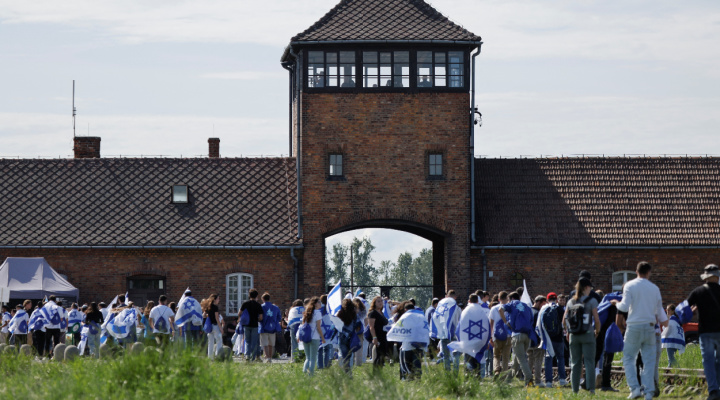People with Israeli flags attend the International March of the Living at the former Auschwitz Nazi German death camp, in Brzezinka near Oswiecim, Poland, May 6, 2024. Photo: REUTERS/Kuba Stezycki
What good are the lessons of the past if we fail to act when the same dangerous patterns reemerge?
Walking through Auschwitz this spring for the March of the Living — commemorating 80 years since the end of World War II — and flanked by Holocaust survivors and recently released Israeli hostages, I felt history folding in on itself. The patterns are too familiar.
The question that haunted me there still echoes today: What becomes of our vows to remember, to protect, and to prevent, when the warning signs are back and the world looks away?
Jews around the world are facing a profoundly dangerous and painful moment — one marked by rising violence, radicalized rhetoric, and the reemergence of propaganda tactics that eerily echo Europe in the 1930s. Dehumanization. Disinformation. Denial. These tools are not relics of the past. They are alive and active in today’s discourse — and they are working.
Propaganda feeds disinformation and breeds dehumanization. It conditions people to look away. It turns murder into “resistance,” hostages into “bargaining chips,” and raped women into “unconfirmed reports.” It silences the world’s conscience. It doesn’t just obscure the truth — it erases it.
Despite the photos, the videos, the eyewitness accounts, and the physical evidence, denial of the sexual violence of October 7 continues to spread.
Survivors have not only been doubted but actively dismissed — by academics, media institutions, international bodies, and political figures. This collective refusal to confront violence against Jewish women and men is not simply a blind spot. It is a form of complicity.
But perhaps the most chilling of all is the silence. The refusal to speak, to confront, to believe — even in the face of overwhelming evidence. That silence is not neutral. It is the final stage of a propaganda campaign designed to dehumanize its victims so thoroughly that their suffering becomes inconvenient — or worse, invisible.
That silence, that erasure, is what drove me to act.
One year ago, together with Jewish Women International, I led a delegation of women — lawyers, judges, physicians, activists, and journalists — to Israel to say clearly and unequivocally: We believe you. That trip launched I Believe Israeli Women (IBIW), a global movement to affirm and amplify the truth of the sexual violence that occurred on October 7, and to defend the dignity and humanity of those who experienced it.
Because when we deny or ignore the use of rape as a weapon of war, we don’t just fail Israeli women and men — we fail all survivors everywhere. We fail Yazidi women. We fail Ukrainian women. We fail Rohingya women. We fail Sudanese women. We fail survivors of sexual violence in every war zone, whose trauma is met with silence.
Denial doesn’t only erase the truth — it endangers the next victims.
Since October 7, I have met many survivors. What galvanized me was not just their pain — it was the reaction to their pain. Their trauma was not only doubted, but often dismissed, ignored, or even justified. That dismissal felt chillingly familiar. It reminded me of what my parents endured before, during, and after the Holocaust — when neighbors turned away, when cries for help were ignored, and even after liberation, when stories were met with denial and disbelief. The world did not want to see the Jewish people then. And many don’t want to see us now.
On our most recent visit to Israel, my mother — a Holocaust survivor — met with and embraced a young survivor of the Nova music festival massacre. My mother told her: “I’m a survivor. You’re a survivor. Keep telling your story –it’s so important for the world to hear.”
That moment stays with me. It is the unbroken thread between generations of survivors. From Auschwitz to Be’eri. From the Holocaust to October 7.
The message is the same: Choose life. Live it fully. Speak the truth.
At a time when our pain is erased, our trauma denied, and disinformation spreads faster than truth, we must raise our voices — fiercely and publicly. We cannot afford to look away.
We must refuse silence and denial. We must confront disinformation and the propaganda that fuels it.
We must stand with all survivors of gender-based violence — without exception or excuse.
And we must reject every attempt to justify, erase, or minimize atrocity.
Above all, we must remember that “Never Again” is not a guarantee — it’s a responsibility we all share.
Dr. Marcy Gringlas is president of Seed the Dream Foundation and co-founder of the I Believe Israeli Women Initiative.
The post From Auschwitz to October 7: The World Is Looking Away — Again first appeared on Algemeiner.com.
Click this link for the original source of this article.
Author: Marcy Gringlas
This content is courtesy of, and owned and copyrighted by, https://www.algemeiner.com and its author. This content is made available by use of the public RSS feed offered by the host site and is used for educational purposes only. If you are the author or represent the host site and would like this content removed now and in the future, please contact USSANews.com using the email address in the Contact page found in the website menu.








